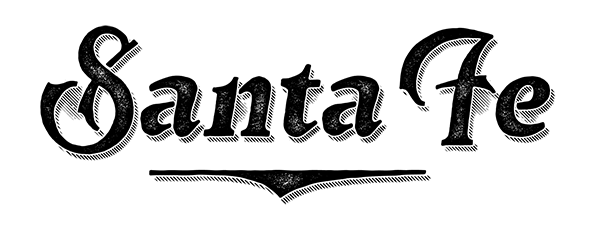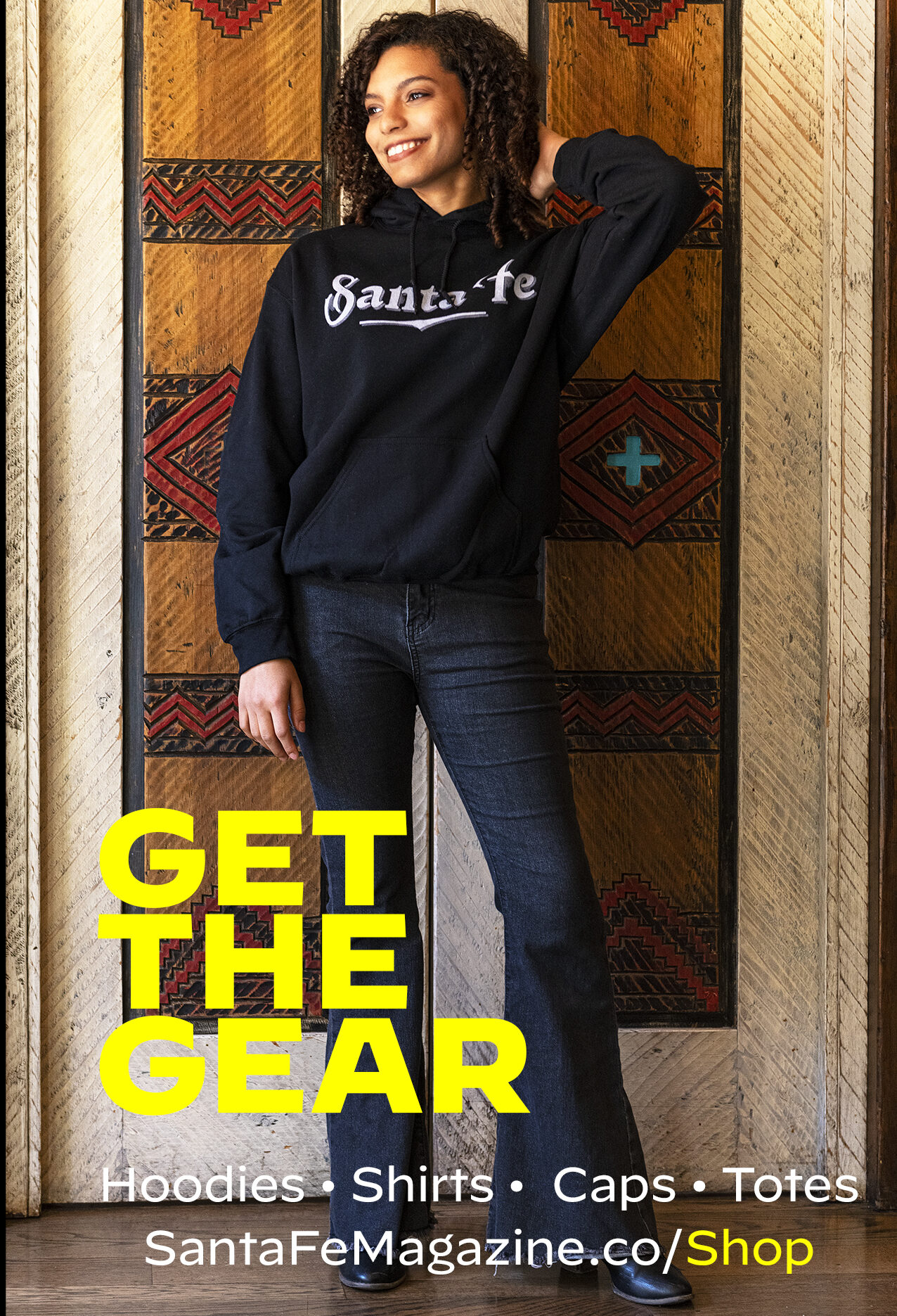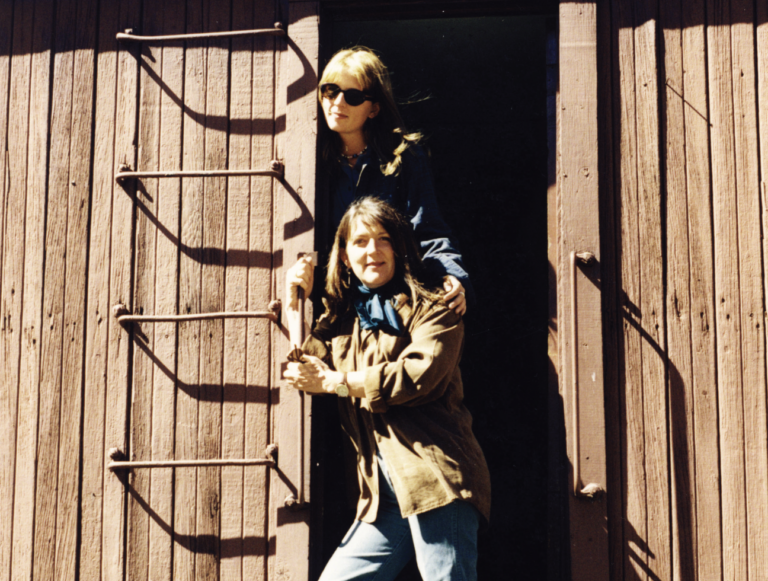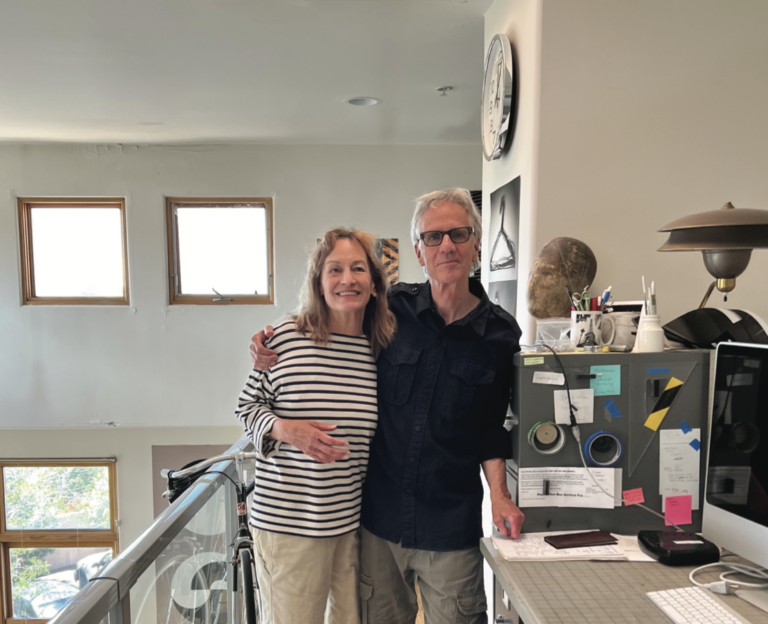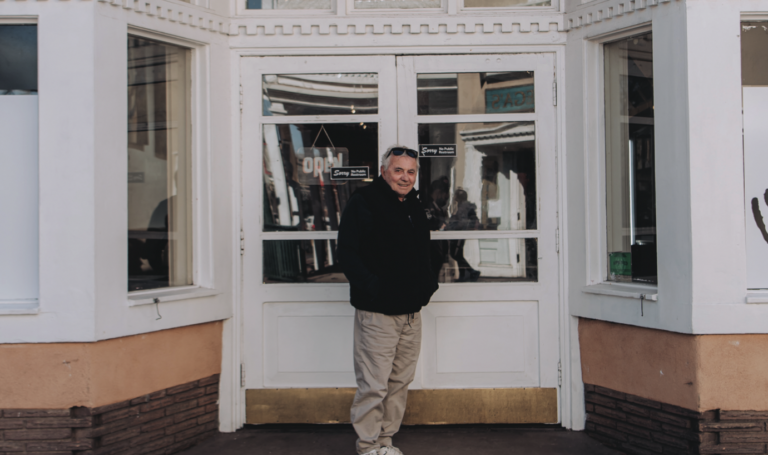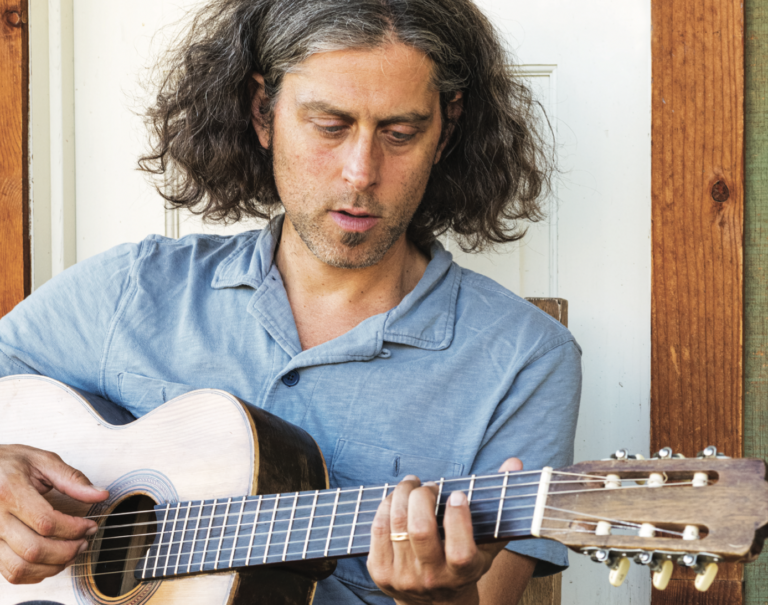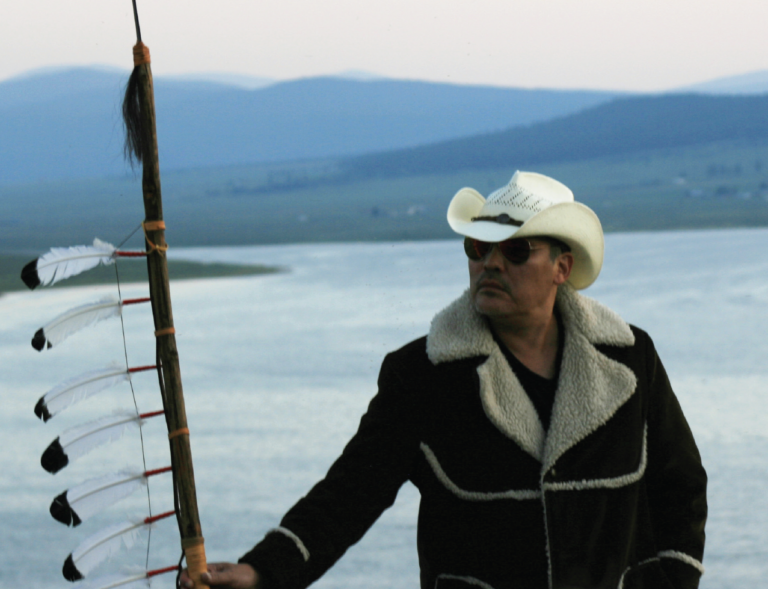IT WAS A DOG DAY SUNDAY AT INDIAN MARKET. And I was gob-smacked by the intensity of so much good art and so many good friends.
But I was also exhausted and already late for dinner with my wife and daughter. As I headed to Palace Ave, something like music wafted from the Plaza, something familiar but strange. I turned back and approached the source: the stage near the decapitated obelisk. There I saw a young man swaying, in black shorts and tank top, with tattoos and long black hair flying, almost levitating – playing an electric fiddle. I was transfixed.
Text message appears on phone: Where are you?
But I had to stay. Who is this kid who seemed to take his instructions from another planet? It wasn’t bluegrass, it wasn’t Celtic, it wasn’t heavy metal. And it wasn’t Mozart. It was sort of all of it and yet none of it. Who is this guy? I tried to get closer, wrestling with the chaotic crowd surrounding him, but ended up talking to a young woman who seemed to be enjoying this as much as I was.
Who is this kid!? I asked.
He’s my boyfriend.
How did you come to play the fiddle?
I heard The Devil Went Down to Georgia by Charlie Daniels, with my grandpa. I was cruising in his ‘87 El Camino one day – we were going to the grocery store. And my grandpa was like my second father – he taught me to run a chainsaw, taught me to drive a lawnmower, all the big basic stuff that my dad would never let me do. So my grandpa was like, No, you need to know how to do this. You’re gonna learn how to drive a truck. So that’s what I did. I looked up to him big time. I vividly remember driving that truck hearing The Devil Went Down to Georgia, and I heard the devil’s solo, and it was like this scary, eerie, powerful sound.
Why was it scary?
Because the violin is a close register to the human voice. It can translate emotion through that similar register. And so then after the Devil’s solo comes Johnny’s solo, and that sounds the opposite. It sounds like this triumphant, gargantuan, greater good sound. I was scared, but inspired.
So I was eight when I told my grandpa, I wanna learn how to play fiddle! He was overjoyed; he was a country guy who lived out in Kansas. He’s full-blooded Oneida. And then he and I talked to my folks, and then they enrolled me in a class orchestra to learn classical violin. But I didn’t want to learn classical violin. I wanted to learn how to play fiddle. So my mom got me a fiddle.
What’s the difference between a fiddle and a violin?
My joke is ‘one has strings, the other has strangs.’ But actually, it’s all an Americanized style of playing the violin. It incorporates a lot of blues. I think that if it wasn’t for blues music, bluegrass wouldn’t exist.
So when I asked for lessons, my mom said, If I’m gonna pay for this, you gotta give this two years and you can’t stop or else I don’t want to hear it. If I’m going to invest in this, you better stick with it. And then she said that she didn’t think I was going to do it. I later learned that my great-grandfather, who was a full-blooded Potawatomi guy on my dad’s side, was a self-taught fiddle player and did gigs, but he passed away before I was born. I never got to meet him. Maybe it just runs in the family.
Do they represent a different class? Are you thought to be higher or lower than more traditional violin players?
My other joke is, the difference between a violin and a fiddle is that ‘a fiddle’s got beer on it.’
But honestly, fiddle is when you put the instrument into the hands of people that don’t have the resources to learn classical violin. They make it theirs. I think at the essence of fiddle music, you’re making it yours. Almost like breaking the rules, because you see fiddle players and they don’t conventionally hold it how a classical player would. They may even have the fiddle in their lap when they’re on their front porch with their dog drinking moonshine.
You’re Native. What tribe do you identify with?
My mom is full-blooded Navajo, my dad is an Algonquian Potawatomi and Kickapoo. That makes me a mutt.
My dad was an ‘80s Hard Rocker. He’s class of ‘85. He had the mullet and everything in high school and he was really big into Van Halen, Santana, Boston, and AC/DC. The sound of a wailing guitar was always present.
So I was learning guitar and playing and singing in a metal band and put the violin away for like four years. I wanted to be a guitar player. But there was something that always was calling me back.
For a few years, I listened to nothing else but metal and then I got more into hip-hop and rap. I was coloring my palette. I couldn’t tie myself to one genre. And the violin show could be a genre bending sort of thing.
How can I break the rules? How can I bend it? It’s like I’m doing something different. I moved out here to Albuquerque and I spent a lot of time playing on the street. A lot of my first audience were the homeless people down on Central.
I would show up around 9:30pm and I’d play till 1:30 in the morning and it’s just craziness out there, it’s people fighting. There are cops running around everywhere. There are people getting tackled and I’m playing my fiddle music out there, you know what I mean?
What did that teach you?
One guy came up to me and he’s like, You know I really appreciate you being out here and doing this. They won’t let us into the venues here, they know we don’t have money to spend on anything, so this is the closest to a legit show that we get exposed to, you know?
There was one time, I was playing and I had a good crowd, like 25, 30 people all in front of me, and I was doing my thing. I have my eyes closed, and I feel like if I look at the crowd too much, then I lose the kung fu, the flow that’s happening.
There was this old woman that lived on the street, and she was coming through with her walker, and she dropped a $5 bill into my case. And then she turned around and walked back out. I was shown respect on that level, which gave me a lot of humility. When I play, I always retreat back to that street.
How do you explain to people what you do?
I’m a storyteller. I’m a guide to show people how to live. At its core, as an artist, that’s what we do. We show people how to live in the present moment, we celebrate it, with who we are, our essence, our spirits.
Like Native American ceremonial songs. When I was a kid, I was in a powwow drum group. I sang and played on the drum with other kids. My father, our mentor, our elder, his name was Chubb Mascot. That was my first exposure to this musical thing and how we represent ourselves. You know?
When I was a kid, I was so freaking proud I was Native. I was like, man, that’s freaking cool. I come from these proud people, I have heritage. These people respected the land, they respected everything else around them. They look badass with their hair and their feathers, and everything’s colorful, you know? But as a kid, I tried to wear that on my sleeve. I tried to educate people, which made me a target.
You got shit for that.
Yeah. It taught me to reel it back. Today I don’t introduce myself as a Native American. I tell people my Indian name, but you don’t see me wearing feathers. You don’t see me wearing paint on my face. It’s not a Native-centric show. But I wear my heritage and my Indigenous identity in my heart, you know?
Then that makes me bulletproof. There’s people that walked and died for me to be here. There’s people that prayed for me to exist. When I get up on that stage I try to stand tall amongst all the varying energies in the crowd. This is who I am. And at the end of the day, I’m still on that sidewalk on Central.
How did you get started professionally?
After college, in Kansas City, I got a job repairing violins. Then eight or nine months down the road I ran into this singer, Shawn James, a soul singer out of the south side of Chicago. He grew up singing in gospel churches, he’s a phenomenal singer. His show has multiple vibes, kind of a shape-shifting in his band, all kinds of music. I met him and we hit it off, and he was like, Hey, man, come out to my next show. We’ll jam and we’ll see how it feels. I showed up, and he said, I’m gonna give you three songs, and you’re gonna audition. I was like, Okay, all right, let’s do it. Whatever you throw at me, go. And there were songs that he didn’t even tell me what key we were in. He just started playing. And I just jumped in. It was an unholy union.
A month later, he hit me up and said, Let’s go tour Europe. Let’s go play Wacken. Wacken is in Germany; it’s the biggest metal festival in the world. And for a little Indian Kansas boy that was like a fairytale. Then I started my professional touring career with Shawn James.
Why are you in New Mexico?
I grew up in bluegrass circles in Kansas where it was mostly white people. There was never any racial prejudice or anything of that kind. I made a lot of friends but at a certain point it was like, What are MY people doing? I still had a strong identity as an Indigenous person.
Then my parents divorced and my mom moved to New Mexico. She had been raised in Shiprock and wanted to be closer to her relatives and family. I’m a mama’s boy, so I said, All right, I’ll go live with mom for a little bit, check out the scene and see what it’s like. When I came here and saw the vibrancy of all the styles of art that all the Indigenous people were doing, I was just blown away.
There’s videographers, potters, painters, rappers, metal bands, Native reggae bands, and Native country bands. I loved it. And over the years, I’ve just continuously showed up, put on a good example, and tried to help people. I’ve built a very beautiful foundation of people here that I call friends and family.
So you’ve come home.
It’s weird. I never saw myself living here, ever. But now that I’m here, it’s like, I’m homesick for here, not Kansas.
Learn more at instagram.com/RageWitSage
Photo Ezra Miguel
